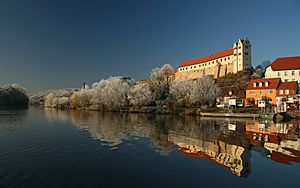Wettin, Saxony-Anhalt facts for kids
Quick facts for kids
Wettin
|
||
|---|---|---|
|
Ortsteil of Wettin-Löbejün
|
||

Wettin Castle on the Saale river
|
||
|
||
| Country | Germany | |
| State | Saxony-Anhalt | |
| District | Saalekreis | |
| Town | Wettin-Löbejün | |
| Elevation | 73 m (240 ft) | |
| Population
(2009-12-31)
|
||
| • Total | 2,355 | |
| Time zone | CET/CEST (UTC+1/+2) | |
| Postal codes |
06193
|
|
| Dialling codes | 034607 | |
| Vehicle registration | SK | |
| Website | www.wettin.de | |
Wettin is a small town in Germany. It is part of the Wettin-Löbejün area in the Saale District of Saxony-Anhalt. The town sits on the Saale River, just north of the city of Halle.
Wettin is famous for Wettin Castle. This castle was the original home of the House of Wettin. This powerful family once ruled many countries. They were kings and queens in places like Saxony, Poland, the United Kingdom, Belgium, and Bulgaria. The name "Wettin" and the town itself have roots in Slavic languages.
Contents
Where is Wettin Located?
Wettin is found in the Saalekreis (Saale District). This district is in the eastern German state of Saxony-Anhalt. The town is right on the Saale River. This river later flows into the Elbe River further north.
Wettin is part of the Wettin-Löbejün community. This community is next to Halle-on-the-Saale. Halle is the biggest city in Saxony-Anhalt. The Saale District, where Wettin-Löbejün is, completely surrounds the city of Halle. The closest big airport is Leipzig/Halle Airport. It is located southeast of Halle.
Neighboring Villages
The Wettin-Löbejün area also includes several villages. These are Brachwitz, Döblitz, Domnitz, Gimritz, Löbejün, Nauendorf, Neutz-Lettewitz, Plötz, and Rothenburg. Many of these villages also have Slavic names.
Wettin's Past
Wettin was first mentioned in official papers in the year 961. German King Otto I wrote about it as "Vitin civitas." At that time, it was a fortified settlement. It was controlled by Dietrich I von Wettin. He was the first important member of the Wettin family.
His family grew very powerful over time. They became rulers of areas like Lusatia in 1032. Later, they ruled Meissen in 1123. In 1288, Wettin became part of the Archbishopric of Magdeburg. This was when Archbishop Eric of Brandenburg took control.
Mücheln Village
The small village of Mücheln is now part of Wettin. You should not confuse it with the larger town of Mücheln near Merseburg. Mücheln has an old chapel. It used to belong to the Knights Templar. This chapel has been restored.
Lützkendorf's Role in History
During World War II, the Lützkendorf area was important. It had facilities that produced fuel. These places were targets during the Oil Campaign. This meant they were bombed to stop fuel production. The Lützkendorf area also got lignite (a type of coal) from a nearby mine. This coal was used in the fuel-making process.
Images for kids
 | May Edward Chinn |
 | Rebecca Cole |
 | Alexa Canady |
 | Dorothy Lavinia Brown |


